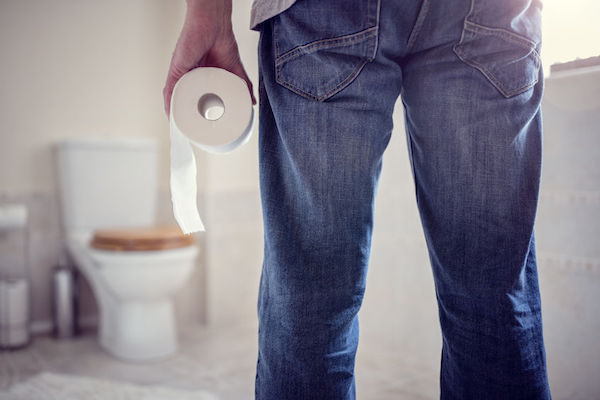Diarrhoea is the frequent discharge of faeces from the bowels in the form of loose stools. It’s generally a symptom of bowel infection. Diarrhoea causes could be viral (for example, the rotavirus or norovirus that can both cause gastroentiritis), from bacteria (for example, E. coli, salmonella), or parasitical. Bacterial infections are commonly due to food poisoning.

Further causes of acute (short-term) diarrhoea include anxiety and excessive alcohol consumption. It may also present as a side effect of certain medication, including antibiotics and chemotherapy medicine.
Conditions that can cause long-term diarrhoea include irritable bowel syndrome (IBS), inflammatory bowel disease (IBD), coeliac disease (adverse reaction to gluten), inflammation of the pancreas and bowel cancer.
In infants and small children, diarrhoea can be a symptom of a food allergy or intolerance, teething, too much fruit juice, an ear infection or bacterial or viral infections.
What are its symptoms?
The symptoms of diarrhoea include the following:
- Loose, watery stools
- Frequent – and urgent – bowel movements
- Incontinence (leakage)
Diarrhoea is often accompanied by:
- Lower abdominal pain (cramps)
- Vomiting and nausea
- Fever
- Thirst
- Bloating
- Headache
Seek medical attention if you have diarrhoea that’s accompanied by blood in the stools, rectal pain, or if food poisoning is suspected.
Complications of diarrhoea include dehydration, a condition that is potentially life threatening if not treated timeously. Be especially careful with children who have diarrhoea accompanied by vomiting, as they tend to become dehydrated more quickly than adults.
Seek medical attention if your infant or toddler has six bouts of diarrhoea and/or three bouts of vomiting in a 24-hour period and is urinating less than usual (four or less wet nappies in 24 hours or no urinating for eight hours in older children). Other signs of dehydration include absence of tears, thirst, dry skin, mouth and tongue, sunken eyes, greyish skin and a sunken fontanelle (the soft area at the top of a baby’s skull).
How is it diagnosed?
To diagnose the cause of the diarrhoea your doctor will ask a number of questions, including if you’ve travelled, whether other members of the family are or were ill, or whether you or your child might have been exposed to contaminated food. Other information to aid diagnosis will include:
- The duration and frequency of the diarrhoea
- A description of the stools
- The presence of additional symptoms
- If you’re on any medication
- Whether you’ve been suffering from anxiety
Your GP may order a stool-sample analysis to ascertain if infection is present or a blood test to determine if an underlying condition is causing the diarrhoea, for example, IBS. A rectal exam may be performed to check for any abnormalities in the rectum or bowel.
Further tests may include a sigmoidoscopy, which involves examining the rectum and lower section of the colon with a flexible tube that has a light and camera, or a colonoscopy, a similar procedure that examines the entire colon.
What are your treatment options?
Acute diarrhoea usually lasts two to four days in adults, and four to six days in children, depending on what type of infection is present.
Home treatment for adults includes:
- Keeping hydrated with liquids that contain salt and sugar, for example, soup broth and diluted fruit juice.
- Over-the-counter oral rehydration solutions (ORS): these replace salt, glucose and other minerals that may be lost.
For infants, if you are breastfeeding, keep feeding on demand, and if your baby is also on solids, try to offer them the food they would normally eat. With formula feeding, continue as usual – and note, it isn’t necessary to dilute the formula. If your child is not taking fluids well, speak to your Clicks pharmacist about oral rehydration solutions, and the appropriate dosage for your child.
Your Clicks pharmacist can also advise on suitable antidiarrhoeal drugs (for example, loperamide), which slows down the muscle movement in the gut and is suitable for adults and children older than 12. For bacterial infections, your GP may prescribe antibiotics.
If the cause of the diarrhoea is an underlying condition, appropriate treatment can be discussed with your doctor. For example, medication and changes to diet can assist with diarrhoea associated with IBS.
Can it be prevented?
There are ways to minimise catching infectious diarrhoea. Steps for prevention include:
- Practising good hygiene, such as frequent and thorough hand-washing, especially after using the toilet and touching commonly-used surfaces
- Hygienic food preparation and thorough cooking of meat products
- Disinfecting commonly-used areas and utensils
- Not sharing utensils and cloths with a person who is already ill
- Avoiding known triggers if you suffer from an underlying condition
- If possible, keep children at home if there is a stomach bug doing the rounds at school or preschool.
Speak to your GP about the rotavirus vaccination, and take care when travelling to foreign destinations where water or food sources may be suspect.
FEATURED PRODUCT: Clicks Digestive Health products
Make use of the convenience of online shopping to address your digestive complaints (including bloating, constipation and diarrhoea) and ensure a healthy tummy with our trusted digestive health products.
IMAGE CREDIT: 123rf.com
